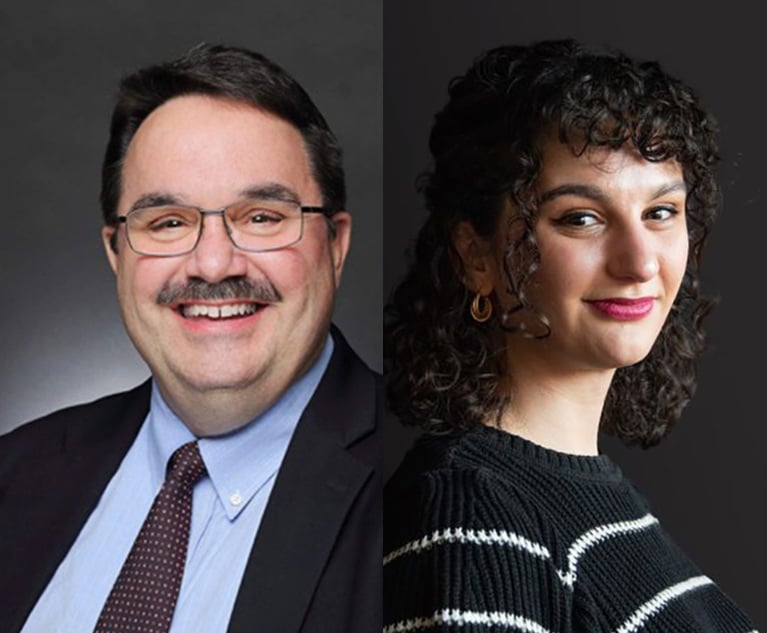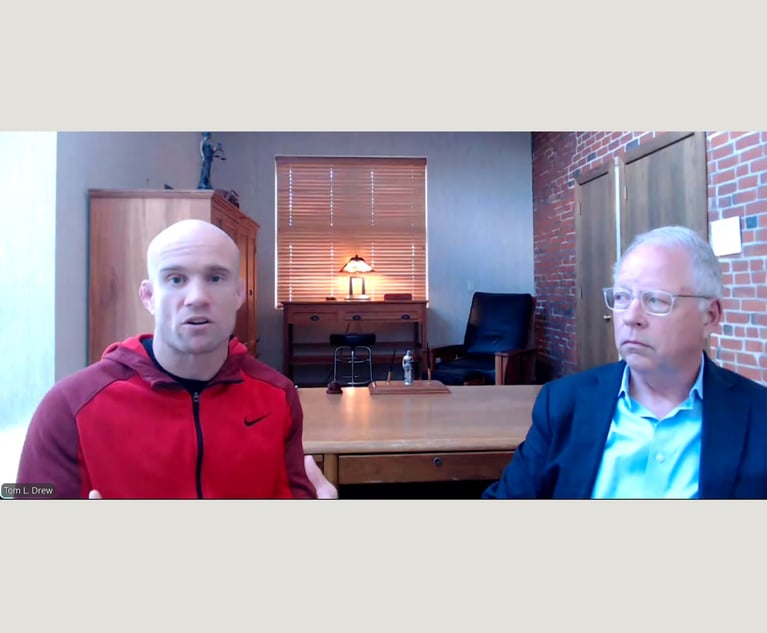Daily Dicta: If Only Adnan Syed Was a Kennedy Cousin Like Michael Skakel
In challenging their murder convictions, both men claimed ineffective assistance of counsel. The results send a discomforting message about equal treatment under the law.
March 11, 2019 at 01:44 PM
7 minute read
This is a tale of two wealthy, liberal East Coast states: Maryland and Connecticut.
And two criminal defendants: A poor Muslim in Baltimore and a Kennedy cousin in Greenwich.
 Michael Skakel, left, and Adnan Syed, right.
Michael Skakel, left, and Adnan Syed, right.
And two very different outcomes after both were convicted of murder.
On Friday, Maryland's highest court ruled that Adnan Syed–he of “Serial” podcast fame—would not get a new trial, never mind that his original lawyer overlooked testimony from a witness on his whereabouts when his ex-girlfriend Hae Min Lee was murdered in 1999.
The ruling comes 10 months after the Connecticut Supreme Court overturned the 2002 conviction of Kennedy cousin Michael Skakel—because his original lawyers overlooked testimony from a witness on his whereabouts when his neighbor, 15-year-old Martha Moxley, was murdered in 1975.
In both cases, the state high court votes were close—4 to 3. But the results still send a discomforting message about equal treatment under the law.
Because Skakel had if not the best legal defense money could buy, then something approximating it—a trial team that included Greenwich, Connecticut-based criminal defense lawyer Mickey Sherman plus three associates and defense consultants F. Lee Bailey, William F. Dow III, Richard Emanuel, David S. Golub, David T. Grudberg and Barry Scheck.
 Syed had Baltimore solo practitioner Cristina Gutierrez, who had a solid reputation as a criminal defense lawyer but by the time of Syed's trial in 2000, was ill with multiple sclerosis and diabetes. The following year, she was disbarred with consent, citing her health problems. In exchange, the state's attorney grievance committee dropped its investigation into about a dozen client complaints. Gutierrez died in 2004.
Syed had Baltimore solo practitioner Cristina Gutierrez, who had a solid reputation as a criminal defense lawyer but by the time of Syed's trial in 2000, was ill with multiple sclerosis and diabetes. The following year, she was disbarred with consent, citing her health problems. In exchange, the state's attorney grievance committee dropped its investigation into about a dozen client complaints. Gutierrez died in 2004.
The touchstone in both cases is the U.S. Supreme Court's holding in Strickland v. Washington. Did the attorney's work “fall below an objective standard of reasonableness”? And if so, did it result in prejudice?
On Friday, Maryland's Court of Appeals held that Gutierrez's failure to investigate or call alibi witness Asia McClain constituted deficient performance under the first prong of the Strickland test. But the court also held Syed was not prejudiced by the error. As a result, the majority reversed the intermediate court's decision that Syed was entitled to a new trial and reinstated his conviction.
For those of you who didn't listen to Serial—or might have forgotten the details, Lee disappeared on Jan. 13, 1999. The high school senior's body was found about a month later, partially buried in a heavily-wooded Baltimore park. Prosecutors said she had been attacked by Syed in the parking lot of a Best Buy and strangled to death, and that Syed and a friend buried her in the park.
The friend—whose story changed on several key points over time—testified against Syed. Cell tower location data appeared to back him up by placing Syed at the crime scene. (Syed argued Gutierrez was also deficient in failing to challenge the accuracy of the data, but the state high court held that claim was waived because Syed in his petition for post-conviction relief failed to raise it.)
Syed was convicted of first-degree murder and kidnapping and is serving a life sentence.
In arguing ineffective assistance of counsel, Syed's new lawyer C. Justin Brown of Brown Law in Baltimore stressed that Gutierrez failed to contact McClain. A classmate of Syed's, McClain in an affidavit said she recalled seeing and talking to him at a public library around 2:30 p.m. on the day Lee disappeared, and that she was willing to testify.
There's no question Gutierrez was aware McClain could offer an alibi—there are notes about it in her files. And Gutierrez had McClain's contact information, so it wouldn't have been difficult to track her down. But she didn't.
Maryland's high court doesn't excuse Gutierrez's lapse, holding that “At a minimum, due diligence obligated Mr. Syed's trial counsel to contact Ms. McClain in an effort to explore her potential as an alibi witness,” Judge Clayton Greene Jr. wrote for the majority. “Moreover, trial counsel's failure to attempt to contact the witness prior to trial did not constitute a reasonable tactical or strategic decision.”
And yet, the majority held the error wasn't prejudicial. Relying heavily on the testimony of Syed's friend, Jay Wilds, Greene wrote that “the state presented evidence that this was a crime of premeditation and deliberation.”
In addition, the majority noted that McClain could only provide a partial alibi—which did “little more than to call into question the time that the state claimed Ms. Lee was killed and does nothing to rebut the evidence establishing Mr. Syed's motive and opportunity to kill Ms. Lee.”
Also, McClain's statement that she saw Syed at the library “could have been more problematic than helpful to Mr. Syed's case,” Greene wrote. “For example, Ms. McClain's belief about Mr. Syed's whereabouts on the afternoon of January 13, 1999 did not comport with the theory that Mr. Syed's routine was to attend track practice after school.”
As a result, the majority concluded the jurors would have reached the same result whether they'd heard from McClain or not.
The trio of dissenting judges strongly disagreed.
“Not only does Ms. McClain's alibi address the most integral period of time in the case, it presents direct, not merely circumstantial, evidence of Mr. Syed's whereabouts during that time,” wrote Judge Michele Hotten.
“The state offered no eyewitness testimony, or any other evidence for that matter, putting Mr. Syed with Ms. Lee during the time of her death, much less any direct evidence that Mr. Syed caused the death of Ms. Lee,” Hotten continued. “Ms. McClain's alibi was direct, uncontroverted evidence that Mr. Syed was elsewhere at the time of Ms. Lee's death.”
The result in Syed's case contrasts strongly with what happened when Skakel claimed ineffective assistance of counsel in Connecticut.
In that case, it took eight years post-conviction for anyone to even realize a potential alibi witness was overlooked.
On the October night that Moxley was beaten to death with a golf club, Skakel claimed he and some of his brothers were watching television at his cousin's house. They were allegedly there for two hours out of the four to eight hour period during which Moxley's murder reasonably could have been committed.
The cousin said she didn't see Skakel at her house—she was in another room and only heard the boys' voices. Apparently her “beau” did see him there—but for years, no one (including Skakel) thought to ask him about it, nor did he come forward.
That was the unreasonable error by Skakel's defense team that scuttled his conviction. And even though the alibi only covered a portion of the time when Moxley could have been killed, the Connecticut high court still held that the error was prejudicial.
Apparently Connecticut and Maryland now have much different standards for assessing ineffective assistance of counsel. Both seem problematic. Maryland makes it too difficult to receive a new trial, and Connecticut (assuming this wasn't a one-time deal for people related to Kennedys) makes it too easy.
This content has been archived. It is available through our partners, LexisNexis® and Bloomberg Law.
To view this content, please continue to their sites.
Not a Lexis Subscriber?
Subscribe Now
Not a Bloomberg Law Subscriber?
Subscribe Now
NOT FOR REPRINT
© 2024 ALM Global, LLC, All Rights Reserved. Request academic re-use from www.copyright.com. All other uses, submit a request to [email protected]. For more information visit Asset & Logo Licensing.
You Might Like
View All

Helping Lawyers Move Away from ‘Grinding’ and Toward a ‘Flow’

Why Litigation Demand Might Break Firms’ Boom-and-Bust Cycle
Trending Stories
Who Got The Work
Michael G. Bongiorno, Andrew Scott Dulberg and Elizabeth E. Driscoll from Wilmer Cutler Pickering Hale and Dorr have stepped in to represent Symbotic Inc., an A.I.-enabled technology platform that focuses on increasing supply chain efficiency, and other defendants in a pending shareholder derivative lawsuit. The case, filed Oct. 2 in Massachusetts District Court by the Brown Law Firm on behalf of Stephen Austen, accuses certain officers and directors of misleading investors in regard to Symbotic's potential for margin growth by failing to disclose that the company was not equipped to timely deploy its systems or manage expenses through project delays. The case, assigned to U.S. District Judge Nathaniel M. Gorton, is 1:24-cv-12522, Austen v. Cohen et al.
Who Got The Work
Edmund Polubinski and Marie Killmond of Davis Polk & Wardwell have entered appearances for data platform software development company MongoDB and other defendants in a pending shareholder derivative lawsuit. The action, filed Oct. 7 in New York Southern District Court by the Brown Law Firm, accuses the company's directors and/or officers of falsely expressing confidence in the company’s restructuring of its sales incentive plan and downplaying the severity of decreases in its upfront commitments. The case is 1:24-cv-07594, Roy v. Ittycheria et al.
Who Got The Work
Amy O. Bruchs and Kurt F. Ellison of Michael Best & Friedrich have entered appearances for Epic Systems Corp. in a pending employment discrimination lawsuit. The suit was filed Sept. 7 in Wisconsin Western District Court by Levine Eisberner LLC and Siri & Glimstad on behalf of a project manager who claims that he was wrongfully terminated after applying for a religious exemption to the defendant's COVID-19 vaccine mandate. The case, assigned to U.S. Magistrate Judge Anita Marie Boor, is 3:24-cv-00630, Secker, Nathan v. Epic Systems Corporation.
Who Got The Work
David X. Sullivan, Thomas J. Finn and Gregory A. Hall from McCarter & English have entered appearances for Sunrun Installation Services in a pending civil rights lawsuit. The complaint was filed Sept. 4 in Connecticut District Court by attorney Robert M. Berke on behalf of former employee George Edward Steins, who was arrested and charged with employing an unregistered home improvement salesperson. The complaint alleges that had Sunrun informed the Connecticut Department of Consumer Protection that the plaintiff's employment had ended in 2017 and that he no longer held Sunrun's home improvement contractor license, he would not have been hit with charges, which were dismissed in May 2024. The case, assigned to U.S. District Judge Jeffrey A. Meyer, is 3:24-cv-01423, Steins v. Sunrun, Inc. et al.
Who Got The Work
Greenberg Traurig shareholder Joshua L. Raskin has entered an appearance for boohoo.com UK Ltd. in a pending patent infringement lawsuit. The suit, filed Sept. 3 in Texas Eastern District Court by Rozier Hardt McDonough on behalf of Alto Dynamics, asserts five patents related to an online shopping platform. The case, assigned to U.S. District Judge Rodney Gilstrap, is 2:24-cv-00719, Alto Dynamics, LLC v. boohoo.com UK Limited.
Featured Firms
Law Offices of Gary Martin Hays & Associates, P.C.
(470) 294-1674
Law Offices of Mark E. Salomone
(857) 444-6468
Smith & Hassler
(713) 739-1250







